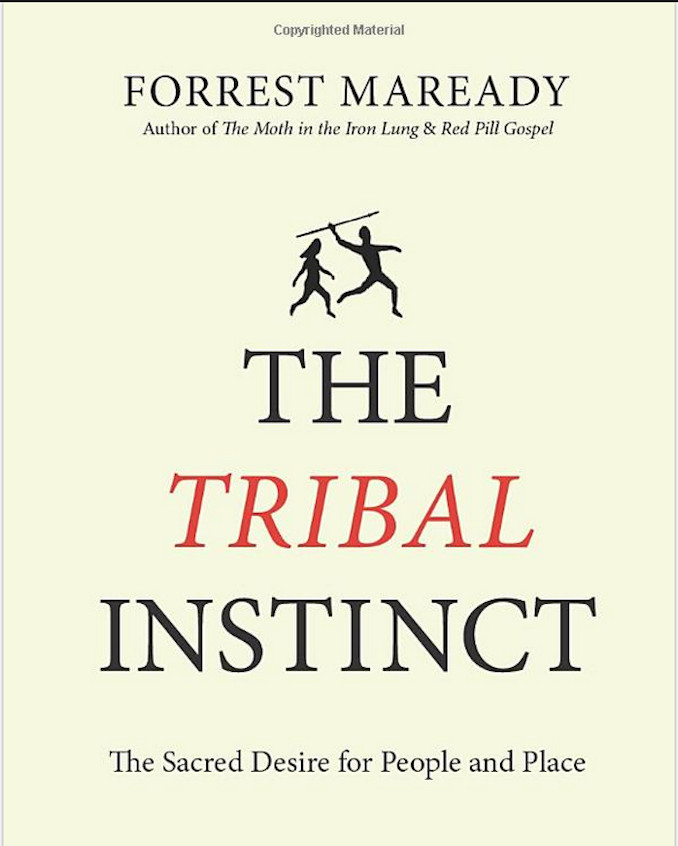
“Something called self-determination theory suggests humans need three things in order to be happy. They need to feel they are good at something. They need to feel connected to the people around them. And they need to feel they can be independent. This may not apply to everyone all the time, but it certainly makes a good case for why so many have such a strong desire for people and place. If there’s anything modernity has ruined, it is our ability to be independent. Many are unable to survive on their own, without frequent help from corporations and government agencies. This has had an intense, negative effect throughout society…. Without tribes, people are unlikely to be happy, particularly if the nation they live within is unable to provide some semblance of those three things.”
~ Forrest Maready
By Catherine Austin Fitts
I am an unabashed fan of American author Forrest Maready. I try to read every book he publishes. I read The Tribal Instinct: The Sacred Desire for People and Place last year, enjoyed it, and then in the rush of travel failed to publish a review. Here it is.
Early in the book, Maready introduces the Welsh word hiraeth:
“Hiraeth is a Welsh word for which there is no English equivalent. Hiraeth is a feeling of homesickness for a home to which you cannot return. A grief for something that was not only lost, but for something you can’t even remember what it was. Many Christians feel an acute sense of hiraeth because they have no tribe. They have no people. No place. No sense of belonging.”
Maready proceeds to unpack what we have lost and why, and makes an eloquent case for returning to more traditional models of family, tribes, and belonging to a people in a place. He is certainly headed in the right direction. Years of work on local economies and building family wealth have indicated to me that creating a profound disassociation from place and family is an essential step to institutionalize central control. It is behind a steady drain in personal health, financial wealth, and family farms and enterprises.
Maready also makes a good case for patriarchy, which is well worth reading whether or not you agree. Rendering men powerless is another essential step for achieving central control. If a father is not free to defend his family, then women and children are easy pickings. If men are not free to organize to protect their community, we will lose both property and human rights.
It is one thing to understand Maready’s message. As I have found, however, it is another thing entirely to implement a return to healthy, supportive families and tribes when we are drowning in a tsunami of divide-and-conquer politics and propaganda. It is hard to identify with your family if they are helping your enemies destroy you and spreading lies behind your back, or with your neighbor who is putting arsenic down your well and getting deals on HUD-foreclosed properties as compensation. Each and every one of us is up against a blizzard of deep-state tactics, and many members of our family and tribe are the victims. That makes collaboration with them risky and a poor investment of our time and money.
Building families and tribes requires an understanding of what David Hughes calls “omniwar.” It would be lovely at some point to see a discussion between Hughes and Maready about how we help ourselves and our families be successful in the current environment. It is evident that building our shared capacity to help protect each other in this environment is increasingly important. As Maready points out in his closing, “You need to accept that the future may be savage.” His admonishment to men is, “We are far too gentle, we are far too nice. We must prepare to defend our people and place.”
For decades, our borders in Europe and North America have been intentionally opened to organized crime networks from societies that are indeed “savage.” Those networks see all of us as easy pickings—and they have the support of governments that feel free to target us in a variety of dangerous ways.
As Maready argues, we need to be prepared “to defend our people and place.” Consider The Tribal Instinct an inspiring call to action that holds out a vision of a life worth living in a place we can call home.
Purchase the book:
The Tribal Instinct: The Sacred Desire for People and Place
Related Reading:
Solari Book Reviews:
Blast from the Past: Week of June 6, 2022: The Forrest Maready Library (links to Catherine’s reviews of The Autism Vaccine: The Story of Modern Medicine’s Greatest Tragedy; The Moth in the Iron Lung: A Biography of Polio; Crooked: Man-Made Disease Explained, and unvaccinated)
Book Review: Red Pill Gospel by Forrest Maready
Other Solari Resources:

